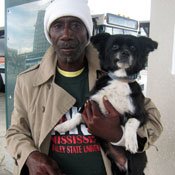Efforts by Jackson police officers to force homeless people out of downtown could land the city in legal trouble, homeless advocates say. In a pattern repeated in cities across the country, the downtown Jackson area's revitalization has coincided with a push by developers and residents to move the local homeless population out of sight.
"You can't find anyone in the city, police, government, that will say homeless people cannot be downtown, because that's obviously illegal," said Heather Ivery, coordinator of the city's 10-year plan to end homelessness. "But that's definitely the trend that's occurring."
Walter Slone, who has been homeless since Feb. 14, 2008, says that patrol officers in Precincts 2 and 5 tell homeless people that they cannot be downtown and tell those approaching downtown from the north or west to turn around. Sometimes those instructions turn into harassment. Slone says that he was handcuffed, sprayed with pepper spray and jailed in August for supposedly trespassing at the JATRAN bus station at Gallatin and Amite streets. In October, two officers on Segways chased him and a friend out of Smith Park when they caught the two men playing chess in the morning, he says.
"Downtown, they just run you out," Slone, who is running for mayor as a Republican, said. "It's eased up a lot since the ACLU got in, though."
Brent Cox, an organizer for the American Civil Liberties Union of Mississippi, first received complaints from homeless people that they were being forced out of downtown in December. He organized a meeting of area homeless people in Smith Park, but police officers disrupted the event, saying that they could not congregate there.
Cox contacted Commander Jesse Robinson, who oversees Precinct 2. Robinson told him that a city ordinance prohibited homeless people from being in Smith Park and that his officers had to arrest those who violated the ordinance. A secretary for Robinson said that he was unavailable for comment.
"There is no such ordinance," Cox said. "But he says that he has been told that this ordinance exists, and that if we want to address the problem that we need to go to City Council."
Jackson does not have a law banning homeless people from downtown, but it does have an ordinance prohibiting solicitation and peddling downtown, which the City Council passed in November 2006. According to Ivery, that prohibition is the only legal basis for patrolmen keeping homeless out of Smith Park.
"All the city has is that ordinance in the downtown area that you cannot panhandle," Ivery said. "Supposedly that's being interpreted as ‘you can't be down there if you're homeless.'"
The anti-panhandling measure is not the city's first attempt at moving the homeless out of downtown. In July 2006, Mayor Frank Melton tried to apply a 10 p.m. youth curfew to homeless people and house the homeless in the Champion Gymnasium. Melton's tactics drew the ire of Michael Stoops of the National Coalition for the Homeless, who compared them to Jim Crow laws.
"There's always been an effort to push the homeless out of the downtown areas, and that's not unique to Jackson," Stoops said last week. "Cities have been trying to solve their homelessness problem by making it illegal to be homeless. There's really no anti-homeless laws on the books but there are laws … targeting the homeless population."
Cities that effectively criminalize homelessness "are opening themselves up to legal action," Stoops said.
The ACLU would like to avoid litigation, Cox said, and asked the city's legal department to clarify the anti-panhandling ordinance for police officers. In response, the City Attorney's office told the ACLU that it needed to request a meeting with city legal officials and the sheriff's department, Cox said. City representatives canceled a March 23 meeting with ACLU officials, however, and have not rescheduled.
"We're doing everything we can to avoid litigation," Cox said. "But if the city just refuses or fails to stop this, then we're prepared to file a lawsuit against the city in order to protect the rights of the homeless."
At a Monday homeless organizing meeting at Galloway United Methodist Church, none of the men present reported any negative interactions with police, and several noted that police officers have recently treated them "professionally." Still, they are staying clear of Smith Park and not lingering downtown.
In the meantime, aggressive policing downtown is contributing to an exodus of homeless to other parts of the city, especially to the west, where day shelters and other social services are heavily concentrated.
Malcolm Woody, who helps lead the multi-church Jackson Street Ministry, moved the group's feeding program from Smith Park and Farish Street to Poindexter Park after police said he could not distribute downtown. On Wednesday nights, Woody's group distributes more than 100 meals in Poindexter Park, across Capitol Street from the Opportunity Center, a day shelter run by Stewpot Community Services.
For many residents of the area around the park, the influx of more homeless people is an almost unbearable burden on their already struggling neighborhood. Ivery, who lives near the Opportunity Center, says that police presence is minimal at the park, despite the increased number of homeless people in the area.
"The crazy thing is, the police will drive by Poindexter Park and see people with open containers and keep rolling," Ivery said. "Because they're not in downtown; they're over there."


